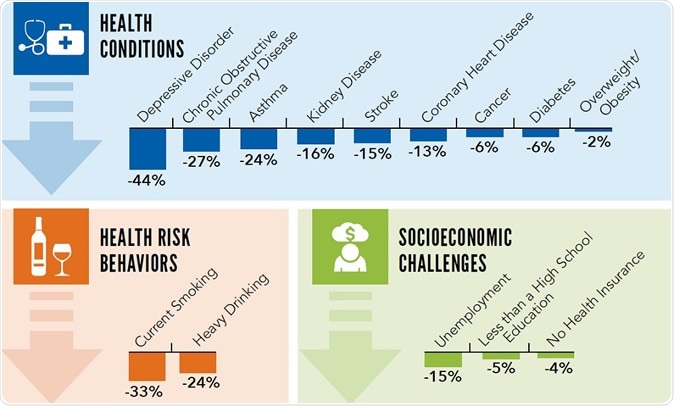The Centres for Disease Prevention and Control (CDC) has released a report citing the dangers of traumatic events occurring in childhood. These traumatic events are named “Adverse Childhood Experiences” or ACE says the CDC and include abuse (physical and mental) or violence or growing up in an environment that is no congenial for development. The CDC report states that children who are exposed to these ACEs are more likely to develop health problems later in life. Some of these problems include, altered brain development leading to alteration in ability of handling stress, mental health problems such as depression and anxiety, substance abuse as adults etc. the latest figures from the CDC were published this week in the Vital Signs, as part of CDC’s Morbidity and Mortality Weekly Report.

The graphic shows three tables on the potential reduction of negative outcomes in adulthood. The first table shows health conditions that could be reduced by the following amounts with adverse childhood experiences prevention: depressive disorder (44%), Chronic Obstructive Pulmonary Disease (27%), Asthma (24%), Kidney Disease (16%), Stroke (15%), Coronary Heart Disease (13%), Cancer (6%), Diabetes (6%), and Overweight/Obesity (2%). The second table shows health risk behaviors. The potential reduction of negative outcomes in adulthood for current smoking is 33% and heavy drinking is 24%. The third table shows socioeconomic challenges. The potential reduction of negative outcomes in adulthood for unemployment is 15%, earning less than a high school education is 5%, and not having health insurance is 4%.
A team of experts worked on the data available at the Behavior Risk Factor Surveillance System (BRFSS) between 2015 and 2017 on which their results were based. For this report the CDC team looked at 144,000 adults (from 25 states) who were given questionnaires to fill up in 2015, 2016 or 2017. The participants reported their health conditions and also provided details about their childhood experiences. These included abuse, domestic violence, drug abuse at home, divorce and mental illness at home etc. the severity of the experiences were not recorded in the questionnaires.
The CDC report suggests that preventing childhood ACEs could prevent up to 21 million cases of depressive disorders, 1.9 million cases of heart disease and 2.5 million cases of obesity. Preventing ACEs in childhood can reduce chronic obstructive pulmonary disease (COPD) by 27 percent, asthma by 24 percent, kidney disease by 16 percent, strokes by 15 percent, coronary heart disease by 13 percent, cancers and diabetes by 6 percent each says the CDC.
The website suggests some ways in which ACEs could prevented during childhood. The report suggests that preventing ACEs during childhood could result in reducing several long term health problems including “depression, asthma, cancer, and diabetes” and also reduce unhealthy lifestyle choices such as smoking, heavy drinking and substance abuse. ACE prevention can foster education, healthy growth and development and increase the chances of employment. The CDC says, “Stop ACEs from being passed from one generation to the next.”
The CDC experts in their report add that at least 61 percent of the adults have had at least one ACE and 16 percent have been subjected to four or more types of ACE. The risk of ACE is greater among women and racial and ethnic minorities (blacks and American Indians and Alaskan Natives) who are at risk of experiencing four or more types of ACEs. The CDC says the most people are unaware of the long term consequences of ACE and its effects on total lifespan.
Can preventing childhood trauma improve adult health? November 2019, Vital Signs
The officials at the CDC add that these numbers are not proof that these diseases are caused by ACE and do not rule out other factors that lead to these conditions. Jim Mercy, who is one of the leaders in the violence prevention programs of CDC says that the link seen in these numbers however remains strong and cannot be ignored. He said, “There's a lot of evidence connecting these things.” Dr. Dayna Long, a researcher at the UCSF Benioff Children's Hospital Oakland called this latest report “critical” and says that long term toxic stress could have a detrimental effect on health. She said, “Trauma really is a public health crisis that everybody needs to start addressing.”
The CDC webpage also suggests the responsibilities and steps that all stake holders could take. It says the healthcare providers must “anticipate and recognize” the risk of ACEs in the children and also gather history of ACE among adults. It urges healthcare providers to refer such patients to appropriate services and supportive care. Substance abuse management among family members of children must also be a priority says CDC. The CDC urges employers to adopt “family-friendly policies” including paid leaves and adjustable work schedules. Communities must work towards “access to high-quality childcare” and also address financial hurdles in childrearing that could be putting children at risk of ACE. The approaches must be targeted towards homes, schools and other settings, says the CDC. The CDC webpage says that everyone can, “Recognize challenges that families face and offer support and encouragement to reduce stress (and) Support community programs and policies that provide safe and healthy conditions for all children and families.” Stigma must be removed and “safe, stable, nurturing relationships and environments” should be provided for children to grow up in.
CDC Director Robert Redfield, in a statement said, “We now know that adverse childhood experiences have a significant impact on an individual’s future health. Preventing traumatic experiences in childhood and initiating key interventions when they do occur will lessen long-term health consequences and benefit the physical and emotional well-being of individuals into adulthood.”